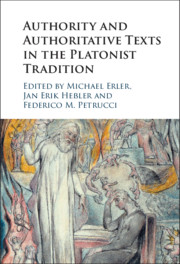Book contents
- Authority and Authoritative Texts in the Platonist Tradition
- Authority and Authoritative Texts in the Platonist Tradition
- Copyright page
- Contents
- Figures
- Contributors
- Acknowledgements
- Abbreviations
- Introduction
- Chapter 1 Xenocrates’ Invention of Platonism
- Chapter 2 An Iconography of Xenocrates’ Platonism
- Chapter 3 Arcesilaus’ Appeal to Heraclitus as a Philosophical Authority for His Sceptical Stance
- Chapter 4 Authority beyond Doctrines in the First Century bc
- Chapter 5 Authority and Doctrine in the Pseudo-Pythagorean Writings
- Chapter 6 Constructing Authority
- Chapter 7 Plutarch’s E at Delphi
- Chapter 8 Aristotle’s Physics as an Authoritative Work in Early Neoplatonism
- Chapter 9 Conflicting Authorities? Hermias and Simplicius on the Self-Moving Soul
- Chapter 10 Kathēgemōn: The Importance of the Personal Teacher in Proclus and Later Neoplatonism
- Chapter 11 ‘In Plato we can see the bad characters being changed by the good and instructed and purified.’
- References
- Index Locorum1
- General Index
Chapter 8 - Aristotle’s Physics as an Authoritative Work in Early Neoplatonism
Plotinus and Porphyry
Published online by Cambridge University Press: 19 February 2021
- Authority and Authoritative Texts in the Platonist Tradition
- Authority and Authoritative Texts in the Platonist Tradition
- Copyright page
- Contents
- Figures
- Contributors
- Acknowledgements
- Abbreviations
- Introduction
- Chapter 1 Xenocrates’ Invention of Platonism
- Chapter 2 An Iconography of Xenocrates’ Platonism
- Chapter 3 Arcesilaus’ Appeal to Heraclitus as a Philosophical Authority for His Sceptical Stance
- Chapter 4 Authority beyond Doctrines in the First Century bc
- Chapter 5 Authority and Doctrine in the Pseudo-Pythagorean Writings
- Chapter 6 Constructing Authority
- Chapter 7 Plutarch’s E at Delphi
- Chapter 8 Aristotle’s Physics as an Authoritative Work in Early Neoplatonism
- Chapter 9 Conflicting Authorities? Hermias and Simplicius on the Self-Moving Soul
- Chapter 10 Kathēgemōn: The Importance of the Personal Teacher in Proclus and Later Neoplatonism
- Chapter 11 ‘In Plato we can see the bad characters being changed by the good and instructed and purified.’
- References
- Index Locorum1
- General Index
Summary
The distinction between Middle Platonism and Neoplatonism is controversial, but it remains helpful in that it makes it clear that there are important differences in the philosophical background of Platonist philosophers before and after Plotinus.1 One of these differences resides in their knowledge of Aristotle’s treatises. It can plausibly be argued that Platonist philosophers, from at least Eudorus of Alexandria onward (first century bc), regarded Aristotle as an authority, though not unqualifiedly so, and though his status was clearly inferior to that of Plato.2 Eudorus of Alexandria was certainly involved in the early debates on Aristotle’s Categories, and we know from Alexander of Aphrodisias (in Metaph. 58.25–59.8) that Eudorus proposed an emendation to Aristotle’s report on Plato’s theory of principles at Metaph.
- Type
- Chapter
- Information
- Authority and Authoritative Texts in the Platonist Tradition , pp. 163 - 177Publisher: Cambridge University PressPrint publication year: 2021
- 3
- Cited by

